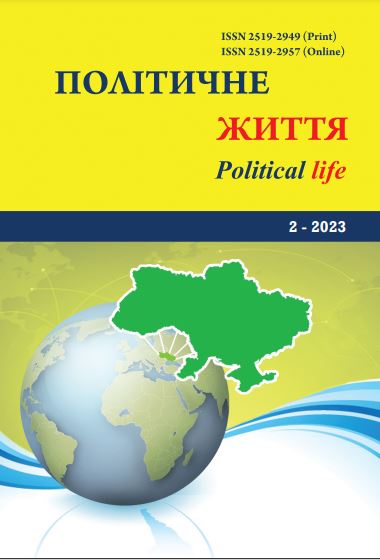Національні рухи постмодерної доби (проект позатериторіального самовизначення народу рома)
DOI:
https://doi.org/10.31558/2519-2949.2023.2.1Ключові слова:
політичний простір; просторовий розвиток ЄС; локальні групи; ромська етнічна меншина; ромський націоналізм; транскордонна нація; Міжнародний комітет рома; етінчний лобізмАнотація
Трансформація світової політичної системи в умовах постмодерну, яка передусім проявляється в процесі поліморфізації акторів соціально-політичної взаємодії, обумовлює необхідність створення нового фільтру для опису практик політичної участі, представництва та самовизначення. Зміни також відбуваються в змістовному наповненні та концептуальному осмисленні ключовий понять політичного буття: «нації» та «держави».
В статті зазначається що сучасний політичний процес не абсолютизує звʼязок між державою та нацією, та їх територіальність. Обидва феномена отримали концептуальну свободу та продемонстрували автономний розвиток в вигляді: недержавних націй; держав, які переосмислюють свою програму національного розвитку; націй, які «виросли» за межі територій своїх держав; держав які не контролюють свої території; дислокальних націй діаспорального (мережевого) типу та інше.
Умовою перегляду концептуального наповнення поняття «нації» та формування нового формату міжнародної системи є визнання активної роли дисперсних етнокультурних систем та локальних соціальних структур меншин. На регіональному, національному та глобальному рівнях зʼявилось багато паралельних місць управління та форм представництва які надають можливість таким групам розбудовувати соціально-політичні системи представницького типу, що є альтернативними до функцій територіальної держави.
Серед дисперсних, заснованих на етнічній ідентичності груп, які прагнуть політичного визнання та представництва, але при цьому не вимагають територіального самовизначення – є рома. Незвичний характер претензій рома на статус нетериторіальної нації став можливим в умовах трансформації територіально-політичного простору ЄС, де процес просторового розвитку відбувається в напрямку обмеження політичного значення національних модерних систем та розширення повноважень локальних просторів та груп.
В статті показаний процес громадської емансипації рома в умовах триваючої інтеграції країн Європи, що дозволило використовувати переваги простору ЄС для формування адміністративного, політичного, соціального та фінансового управління рома. Цей процес демонструє перетворення транскордонної національної меншини на національну систему мережевого типу, яка має належне представництво в ООН та ЄС.
Посилання
Acton T., Klimova I. The International Romani Union. An East European answer to West European questions? Between Past and Future. The Roma of Central and Eastern Europe. Hatfield: University of Hertfordshire Press, 2001. 157–226.
Annual Report 2005, European Commission, Decade for Roma Integration, 2005-2015. «Equality and elimination of discrimination»/ URL: http://ec.europa.eu/social/BlobServlet?docId=1608&langId=el, 24-03-2011. (accessed 10.03.2023).
European Commission, EU Framework Document for National Roma Inclusion Strategies up to 2020, COM 2011. URL: https://eur-lex.europa.eu/LexUriServ/LexUriServ.do?uri=COM:2011:0173:FIN:EN:PDF. (accessed 12.03.2023).
European Roma and Travellers Forum (ERTF) URL: https://www.romaniarts.co.uk/european-roma-traveller-forum/ (accessed 10.03.2023).
Facts Sheets on Roma History and Roma Culture. Project «Education of Roma / Gypsy Children in Europe». – Council of Europe, DG IV Directorate of School, Out-of-School and Higher Education, 2004–2006. URL: https://rm.coe.int/factsheets-on-romani-history-general-introduction/16808b18e9. (accessed 15.03.2023).
Financial and social instrument of uniting community in the World. International roman union Office of the president of IRU Normonds Rudevics. URL: http://iru2020.org/IRU-bank.pdf (accessed 05.04.2023).
Gheorghe N., Acton T. Citizens of the world and nowhere: Minority, ethnic and human rights for Roma. Guy W. (ed.): Between Past and Future: the Roma of Central and Eastern Europe. Hatfield: University of Hertfordshire Press, 2001, Р. 54-70
Horowitz D. A Democratic South Africa?: Constitutional Engineering in a Divided Society. Published by University of California Press. 1991. 295 р.
Horsman M., Marshall A. After the Nation-State: Citizens, Tribalism and the New World Disorder. London: Harper Collins, 1994. 298 р.
Institutionalisation and Emancipation compiled by the editors. Project education of roma children in euroPe URL: https://www.coe.int/t/dg4/education/roma/Source/FS/6.2_emancipation.pdf (accessed 10.04.2023).
Kenrick D. S. The World Romani Congress. Journal of the Gypsy Lore Society, 1971. III Ser., Vol. L, 3: URL: https://onlinebooks.library.upenn.edu/webbin/serial?id=jgypsylore (accessed 10.04.2023).
Liegeois J.-P. Roma, Gypsies, Travellers. Strasbourgh: Council of Europe, 1994. 323 р.
Marushiakova E. The Roma – a Nation without a State? Historical Background and Contemporary Tendencies. Nationalismus Across the Globe: An overview of the nationalism of state endowed and stateless nations. Burszta W., Kamusella T., Wojciechowski S. (Eds.) Poznan: School of Humanities and Journalism, 2005, 433-455.
Marushiakova E., Popov V. The Roma – a Nation without a State? Historical Background and Contemporary Tendencies. Bernhard Streck (Hg.): Segmentation und Komplementarität. Organisatorische, ökonomische und kulturelle Aspekte der Interaktion von Nomaden und Sesshaften. Beiträge der Kolloquia am 25.10.2002 und 27.06.2003. Halle 2004 S. 71–100
Nazerali S. The Roma and Democracy: A Nation without a State. In: Okwui Enwezor, Carlos Basualdo, Ute Meta Bauer, Susanne Ghez, Sarat Maharaj, Mark Nash, Octavio Zaya (ed.): Democracy Unrealized. Documenta11_Platform1. Hatje Cantz Verlag, Ostfildern-Ruit. 2002, pp. 133-149.
OSCE Office For Democratic Institutions and Human Rights Roma and Sinti URL: https://www.osce.org/odihr/roma-and-sinti (accessed 10.03.2023).
Paasi A. A Borderless World. Is it Only Rhetoric or will Boundaries Disappear in the Globalizing World? Politische Geographie. Handlungsorientierte Ansätze und Critical Geopolitics / P. Reuber, G. Wolkersdorfer (Eds.) Heidelberger Geographische Arbeiten. 2001. P. 133–145.
Pietrosanti P. Project for a non-territorial republic of the Roma nation. Manuscript. 1997.
Congress of IRU 9 th in Riga, Latvia. Memorandum. International roman union Office of the president of IRU Normonds Rudevics. URL: http://iru2020.org/#memorandum
Roma Passport. Additional ID document (not valid for travel) URL: http://iru2020.org/#passport
Schmitter Ph. If the Nation-State Were to Wither Away in Europe, What Might Replace It? The Future of the Nation-State: Essays on Cultural Pluralism and Political Integration, ed. Sverker Gustavsson and Leif Lewin. London: Routledge, 1996, pp. 212-213.
Schmitter Ph. Reflections on ‘transitology’ — Before and After. D. M. Brinks, M. Leiras and S. Mainwaring (eds), Reflections on uneven democracies : the legacy of Guillermo O’Donnell, Baltimore : Johns Hopkins University Press, 2014, pp. 71-86
Spruyt H. The Sovereign State and Its Competitors: An Analysis of Systems Change. Princeton, N.J.: Princeton University Press, 1994. 288 р.
Thomas А., Klimovа I. The International Romani Union: An East European answer to West European questions?”. Guy, Will (ed.), Between Past and Future: the Roma of Central and Eastern Europe. Great Britain: University of Hertfordshire Press, 2001. 429 р.
World Roma Federation. URL: https://www.wrf-gov.org (accessed 10.03.2023).

